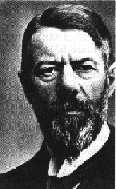Introduction to Sociology
Main Page
Dr. John S. Rice
The University of North Carolina at Wilmington
Some selected quotes from Max
Weber
(in my admittedly biased
opinion, among the most brilliant minds our little species has ever produced)

Max Weber
"Since asceticism undertook to remodel the world and to work out its
ideals in the world, material goods have gained an inexorable power over the
lives of men as at no previous period in history. Today the spirit of religious
asceticism -- whether finally, who knows? -- has escaped from the cage. But
victorious capitalism, since it rests on mechanical foundations, needs its
support no longer. The rosy blush of its laughing heir, the Enlightenment,
seems also to be irretrievably fading, and the idea of duty in one's calling prowls
about in our lives like the ghost of dead religious beliefs. Where the
fulfillment of the calling cannot directly be related to the highest spiritual
and cultural values, or when, on the other hand, it need not be felt simply as
economic compulsion, the individual generally abandons the attempt to justify
it at all. In the field of its highest development, the United States, the
pursuit of wealth, stripped of its religious and ethical meaning, tends to
become associated with purely mundane passions, which often actually give it
the character of sport.
No one knows who will live in this cage in the future, or
whether at the end of this tremendous development entirely new prophets will
arise, or there will be a great rebirth of old ideas and ideals, or, if
neither, mechanized petrification, embellished with a sort of convulsive
self-importance. For of the last stage of this cultural development, it might
well be truly said: 'Specialists without spirit, sensualists without heart;
this nullity imagines that it has attained a level of civilization never before
achieved.'" (The Protestant Ethic and the Spirit of Capitalism [1958,
pp. 181-2].)
"But during the rise of the exact sciences, one expected a great deal
more. If you recall Swammerdam's statement, 'Here I bring you the proof of
God's providence in the anatomy of a louse,' you will see what the scientific
worker, influenced (indirectly) by Protestantism and Puritanism, conceived to
be his task: to show the path to God. People no longer found this path among
the philosophers, with their concepts and deductions. All pietist theology of
the time . . . knew that God was not to be found along the road by which the
Middle Ages had sought him. God is hidden, His ways are not our ways, His
thoughts are not our thoughts. In the exact sciences, however, where one could
physically grasp His works, one hoped to come upon the traces of what He
planned for the world. And today? Who -- aside from certain big children who
are indeed found in the natural sciences -- still believes that the findings of
astronomy, biology, physics, or chemistry could teach us anything about the meaning
of the world? If there is any such 'meaning,' upon what road could one come
upon its tracks? If these natural sciences lead to anything in this way, they
are apt to make the belief that there is such a thing as the 'meaning' of the
universe die out at its very roots.
And finally, science as a way 'to God'? Science, this
specifically irreligious power? That science today is irreligious no one will
doubt in his innermost being, even if he will not admit it to himself.
Redemption from the rationalism and intellectualism of science is the
fundamental presupposition of living in union with the divine. This, or
something similar in meaning, is one of the fundamental watchwords one hears
among German youth, whose feelings are attuned to religion or who crave religious
experiences. They crave not only religious experience but experience as such.
The only thing that is strange is the method that is now followed: the spheres
of the irrational, the only spheres that intellectualism has not yet touched,
are now raised into consciousness and put under its lens. For in practice this
is where the modern intellectualist form of romantic irrationalism leads. This
method of emancipation from intellectualism may well bring about the very
opposite of what those who take to it conceive as its goal.
After Neitzsche's devastating criticism of those 'last men'
who 'invented happiness,' I may leave aside altogether the naive optimism in
which science -- that is, the technique of mastering life which rests upon
science -- has been celebrated as the way to happiness. Who believes in this?
-- aside from a few big children in university chairs or editorial offices. Let
us resume our argument.
Under these internal presuppositions, what is the meaning of
science as a vocation, now after all these former illusions, the 'way to true
being,' the 'way to true art,' the 'way to true nature,' the 'way to true God,'
the 'way to true happiness,' have been dispelled? Tolstoi has given the
simplest answer, with the words: 'Science is meaningless because it gives no
answer to our question, the only question important for us: "What shall we
do and how shall we live?" That science does not give an answer to
this is indisputable. The only question that remains is the sense in which
science gives 'no' answer, and whether or not science might yet be of some use
to the one who puts the question correctly." (From "Science as
a Vocation," [1958, pp. 142-143 in From Max Weber: Essays in Sociology,
edited by Han Gerth and C. Wright Mills.)